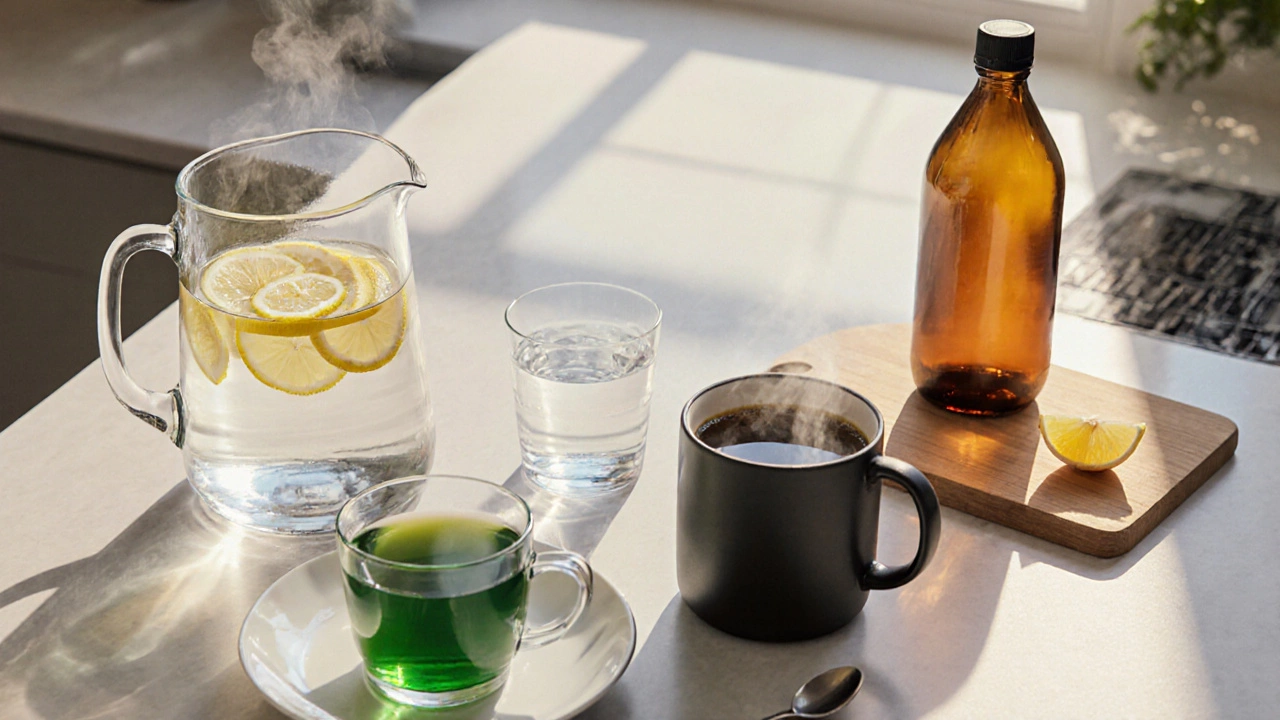
Key Takeaways
- Green tea, black coffee, and apple cider vinegar are the three most evidence‑based weight‑loss drinks.
- Low‑calorie options like lemon water and plain water keep you hydrated without adding extra energy.
- Timing matters - drinking a thermogenic beverage before meals can curb appetite.
- Combine drinks with a balanced diet and regular movement for sustainable results.
- Watch for hidden sugars or excessive caffeine, which can sabotage progress.
When you ask yourself, “best drink for weight loss?” the answer isn’t a magical potion. It’s a handful of everyday beverages that boost metabolism, curb cravings, or simply replace higher‑calorie choices. Below we break down the science, list the top contenders, and give you a quick cheat‑sheet so you can start sipping smarter today.
Weight loss drink is a beverage specifically chosen for its ability to support calorie deficit, improve satiety, or increase metabolic rate. While no single drink can melt pounds on its own, the right choice can tip the energy balance in your favor when paired with a nutritious diet and regular activity.
Why Some Drinks Really Work
Think of your body as a furnace. The more fuel you feed it, the hotter it burns. Certain compounds act like tiny fire‑starters: caffeine, catechins, acetic acid, and electrolytes. They either raise the number of calories you burn at rest (resting metabolic rate) or help you feel full sooner, which naturally limits intake.
Research from the Journal of Nutrition (2023) shows that daily consumption of catechin‑rich green tea lowered average waist circumference by 1.2 cm over 12 weeks. A similar study on coffee reported a 5 % lower risk of obesity in participants who drank two to three cups per day. The common thread? Both drinks deliver bioactive ingredients that stimulate thermogenesis - the process of generating heat and burning calories.
Top Evidence‑Based Weight‑Loss Drinks
Below are the drinks that consistently show a measurable impact on weight‑related outcomes. Each entry starts with a brief definition marked up for search engines.
Green tea is a lightly oxidized tea leaf rich in catechins, especially epigallocatechin‑gallate (EGCG). EGCG boosts fat oxidation and modestly raises resting metabolic rate.
Black coffee is brewed from roasted coffee beans and delivers caffeine, a proven thermogenic stimulant that can increase daily energy expenditure by 3‑4 %.
Apple cider vinegar is a fermented apple juice containing 5‑6 % acetic acid. Acetic acid slows stomach emptying, helping you feel full longer.
Lemon water is plain water infused with fresh lemon juice. The acidity adds flavor without added sugar, encouraging higher water intake.
Protein shake is a blended beverage made from protein powder (whey, plant‑based, or a mix) mixed with water or milk. Protein increases satiety and the thermic effect of food.
Water is the universal hydrator. Adequate hydration supports optimal metabolism and can reduce mistaken thirst for hunger.
Hibiscus tea is an herbal infusion made from dried hibiscus flowers. It contains anthocyanins that may improve lipid profiles and modestly lower blood pressure.

Quick Comparison Table
| Drink | Calories per serving | Key active compound(s) | Typical weight‑loss benefit | Best time to drink |
|---|---|---|---|---|
| Green tea | 2 kcal | Catechins (EGCG) | Modest fat oxidation | Morning or before workout |
| Black coffee | 2 kcal | Caffeine | Increased daily energy use | Morning, no later than 2 pm |
| Apple cider vinegar | 5 kcal (1 tsp) | Acetic acid | Appetite control | 30 min before meals |
| Lemon water | 4 kcal | Citric acid, vitamin C | Hydration, mild metabolism boost | First thing in the morning |
| Protein shake | 120‑150 kcal (depends on powder) | High‑quality protein | Satiety, muscle‑preserving | Post‑workout or as a snack |
| Water | 0 kcal | None (pure H₂O) | Supports basal metabolism | Throughout the day |
| Hibiscus tea | 3 kcal | Anthocyanins | Potential fat‑binding reduction | Evening (cooling effect) |
How to Incorporate These Drinks Into Your Daily Routine
- Start with water. Aim for at least 2 L (or 8 cups) spread across the day. Set a reminder on your phone if you tend to forget.
- Add a morning boost. Brew a cup of green tea or black coffee within 30 minutes of waking. If caffeine makes you jittery, stick to green tea.
- Prep an acetate mix. Dilute 1‑2 tsp of apple cider vinegar in 250 ml of water, add a slice of lemon for flavor, and sip 30 minutes before lunch and dinner.
- Stay refreshed after workouts. Blend a scoop of protein powder with water (or unsweetened almond milk) for a quick post‑exercise shake.
- End the day with a calming brew. Steep hibiscus flowers in hot water for 5 minutes, chill, and enjoy as an evening tea.
These steps require less than five minutes of prep and fit into most schedules, whether you’re a busy professional or a student.
Common Pitfalls and How to Avoid Them
- Hidden sugars. Store‑bought “green tea” or “flavored water” often contain added sweeteners that add 30‑50 kcal per bottle. Choose plain varieties or brew yourself.
- Excess caffeine. More than 400 mg per day (roughly four cups of coffee) can increase cortisol, which may hinder fat loss.
- Acidic overload. Drinking undiluted apple cider vinegar can erode tooth enamel. Always dilute and consider a straw.
- Skipping meals. Replacing a meal with a low‑calorie drink might seem clever, but it often leads to overeating later. Use drinks as supplements, not substitutes.

When to Consult a Weight‑Loss Clinic
If you’ve tried these beverages for 4‑6 weeks and still see no change, it’s time to get a professional opinion. Clinics can run metabolic tests, assess hormonal factors, and tailor a nutrition plan that fits your lifestyle. They may also suggest medically‑approved supplements that complement the drinks outlined here.
Frequently Asked Questions
Can I drink green tea all day?
Yes, but limit it to 3‑4 cups. Too much catechin can cause stomach upset for some people. Pair each cup with a glass of water to stay hydrated.
Is coffee bad for weight loss because of its acidity?
Acidity isn’t a weight‑loss issue. The caffeine is the star, helping you burn a few extra calories. If you’re sensitive to acid, add a splash of milk or switch to cold brew.
How much apple cider vinegar is safe?
One to two teaspoons diluted in a large glass of water, taken before meals, is considered safe for most adults. Consult a doctor if you have ulcer or kidney issues.
Do protein shakes cause weight gain?
Only if you exceed your daily calorie goal. A well‑balanced shake (≈120 kcal) can actually help you preserve lean muscle while you lose fat.
Is plain water really that important?
Absolutely. Dehydration can falsely trigger hunger signals, leading to extra snacking. Drinking water before meals can cut meal‑time calories by up to 13 %.
Bottom Line
There’s no single "magic" beverage that will melt pounds overnight. But swapping sugary sodas for green tea, coffee, or a splash of lemon water can shave off calories, boost metabolism, and keep cravings at bay. Pair these drinks with mindful eating and regular movement, and you’ll see steady progress without feeling deprived.
Ready to test the lineup? Pick one drink, track how you feel for a week, and then rotate to the next. Small, consistent changes win the long‑term battle against excess weight.

Write a comment